November 8, 2025. Day 2 of Youth Festival, Sunim’s Peace Talk Talk, Kim Je-dong’s Direct Talk Talk
Hello. It’s the second day of the Youth Festival. Today, the Jungto Social and Cultural Center welcomed young people with various lectures, seminars, performances, booths, and food prepared abundantly for them.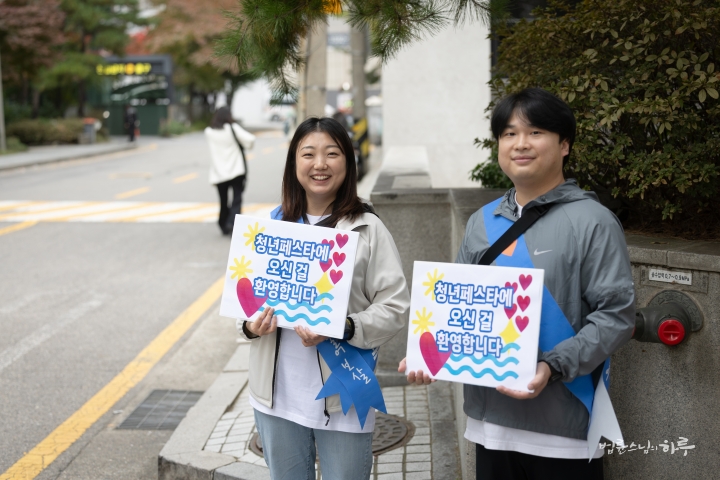
After completing morning practice and meditation, Sunim worked in his office before heading to the 9th floor auditorium at 10:30 AM where the Youth Festival events were being held. The second day of the Youth Festival began with a lecture by Minister of Unification Jeong Dong-young on the theme of “Opening Peace on the Korean Peninsula with Youth.”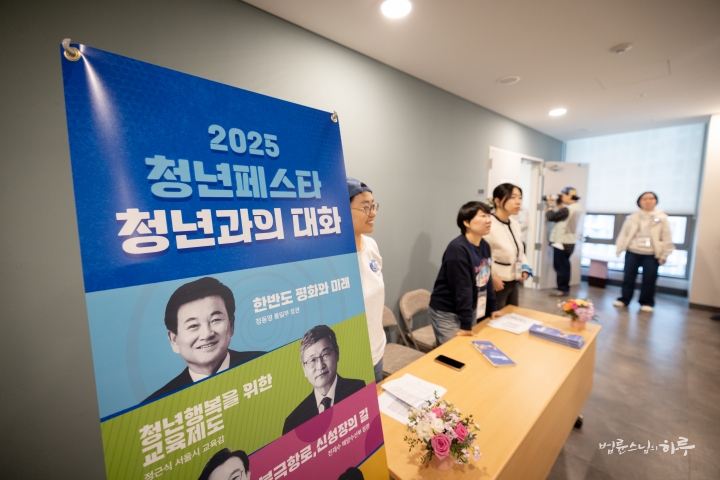
When Minister Jeong Dong-young arrived at the venue, Sunim warmly greeted him.
“Thank you for taking time out of your busy schedule to be here.”
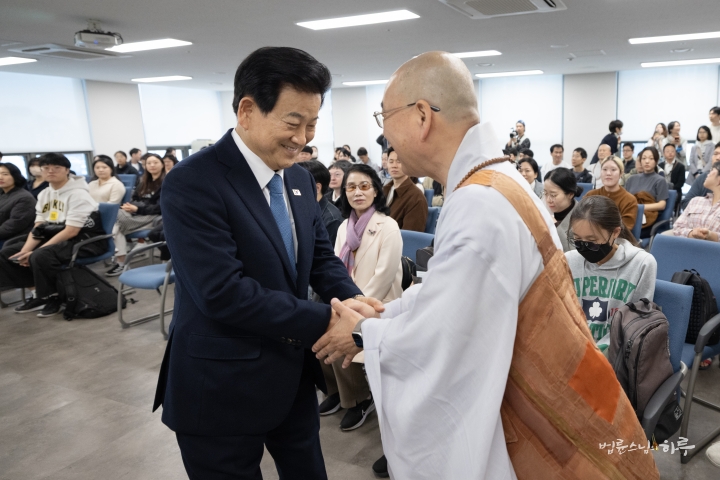
About 100 young people were seated. First, they watched a video of Minister Jeong Dong-young pledging in front of President Kim Dae-jung’s grave to inherit the spirit of when the Kaesong Industrial Complex was first created after becoming Minister of Unification. Then, Minister Jeong Dong-young came up on stage to great applause.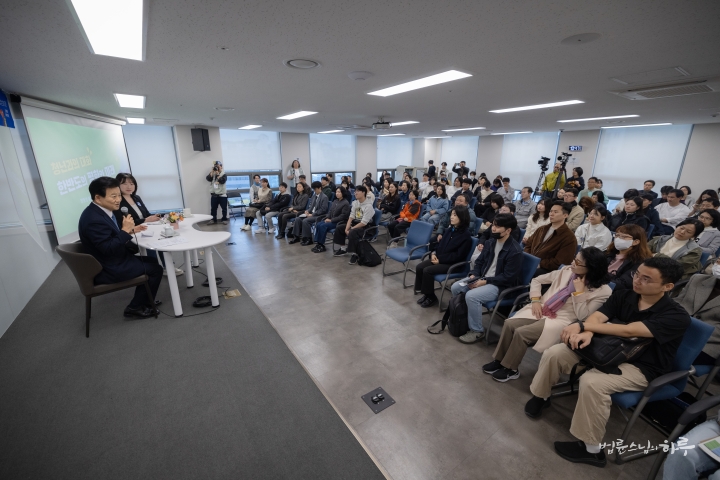
During the hour-long lecture, Minister Jeong Dong-young emphasized that young people should not forget that they are the central generation to reconnect North and South Korea and open the future of the Korean Peninsula.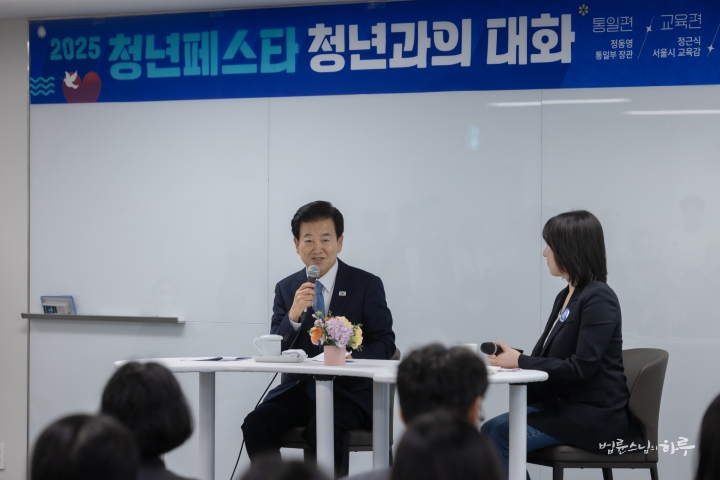
“I believe that the power of youth has always been at the center of South Korea’s journey from colonization, war, dictatorship, and poverty to where we are today. The Kaesong Industrial Complex, where North and South shared daily life, was a precious space where ‘small unification’ was realized, and I consider reopening its doors as my calling. Unification is not a grand slogan but a real issue directly connected to young people’s lives – jobs, culture, and freedom of movement – and it must be achieved through a gradual and peaceful process. Only when time accumulates for North and South to meet and cooperate can unification be possible, and only when we unite domestic public opinion can our diplomatic power come alive in the international community. What we need now is not ideological fighting but courage for peace and coexistence, and only when young people become unification volunteers and peace volunteers can North and South reconnect and the future of this land open.”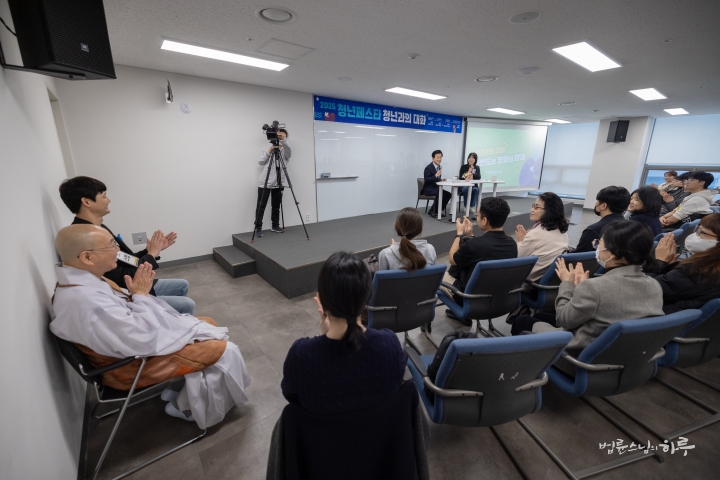
During the Q&A session that followed, young people asked questions about why they don’t see unification as realistic, the divided perceptions within South Korea, and the need for rebranding the Ministry of Unification. Minister Jeong Dong-young broadly exchanged opinions with the youth, emphasizing the importance of resuming dialogue and changing perceptions through direct experience, uniting domestic public opinion, and transforming the Ministry of Unification’s image to suit future generations. Sunim sat in the audience and listened attentively to the communication between Minister Jeong and the young people.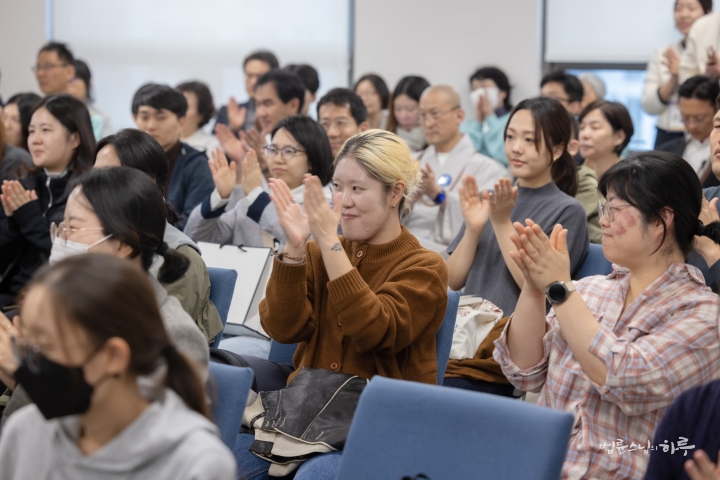
After the lecture, Sunim moved with Minister Jeong Dong-young to the basement dining hall where the food booths were located. They had lunch together and continued an in-depth conversation about ways to improve US-North Korea relations and inter-Korean relations.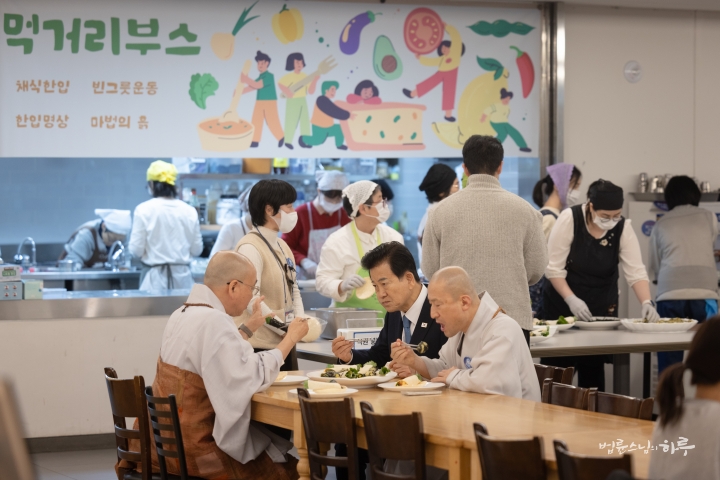
After finishing the meal and seeing off Minister Jeong Dong-young, Sunim attended National Assembly member Kim Ye-ji’s lecture at 1 PM.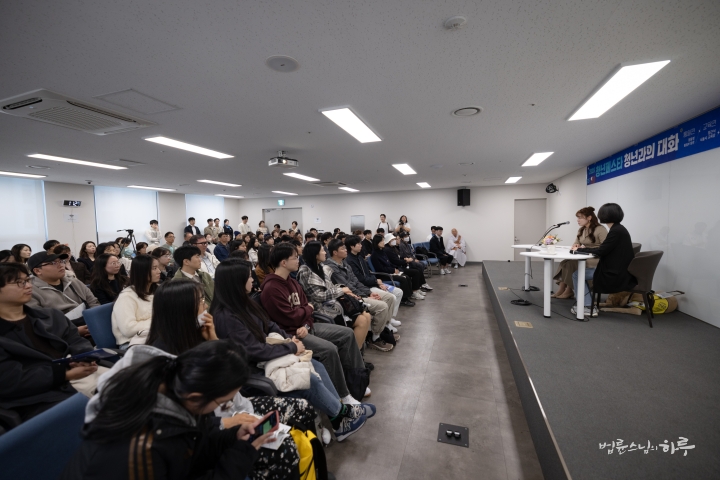
National Assembly member Kim Ye-ji is a former visually impaired pianist who has consistently voiced opinions in the fields of culture, arts, and disability policies. In the National Assembly, she has been working to create practical changes by proposing various bills to enhance the rights of people with disabilities and expand accessibility. At today’s Youth Festival, she made time to share her story about ‘politics without discrimination’ based on her own experiences.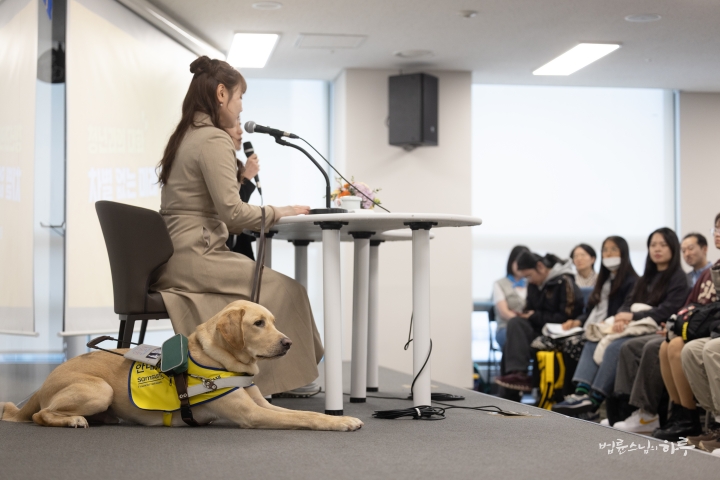
Coming on stage with her guide dog Taebaek, National Assembly member Kim Ye-ji emphasized that young people who respect each other’s differences and have the courage to ask questions are the ones who will create a future politics without discrimination.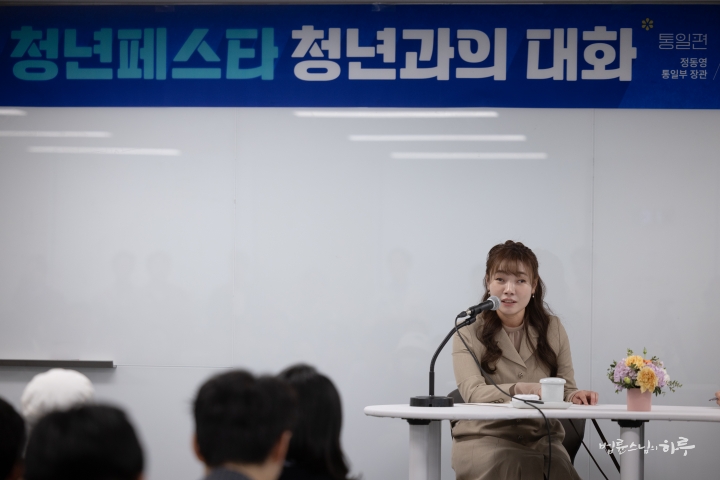
“Disability is not an individual’s limitation but a matter of how fair an environment society provides, and we must always remember that discrimination doesn’t only arise from massive systems but quietly seeps into familiar standards and expressions in daily life. People with different senses, languages, and experiences are not defective but beings who show diversity, and politics is not something done by people sitting in specific positions but begins in your life from the moment you question why something is taken for granted and whose voices are being excluded. Future politics will grow on solidarity rather than competition, on recognition of differences rather than homogeneity, and requires the courage to bear discomfort and make space for each other. Each and every one of you is already a political subject, and the acts of questioning, communicating, and choosing in daily life are the starting point of the ‘politics without discrimination’ we will create together.”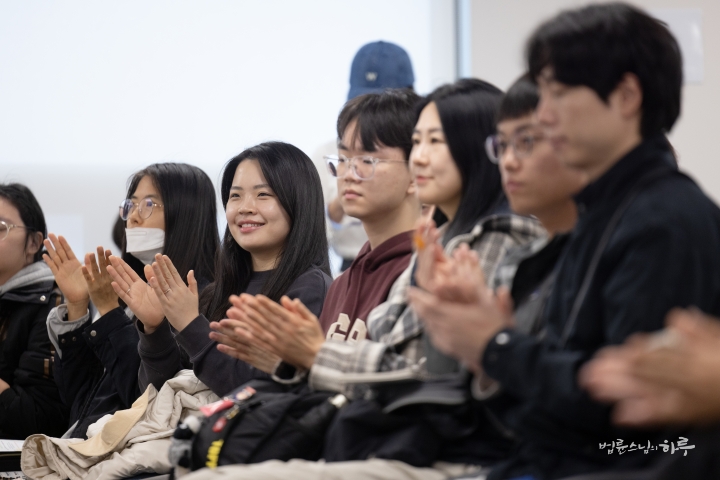
In the Q&A session that followed, young people boldly asked about their real concerns regarding the psychiatric hospital protective admission system, trust in the state, and fairness in real estate policies. Assembly member Kim Ye-ji discussed procedural safeguards, the need for system improvements, and the importance of citizens participating in politics by directly verifying facts. Sunim sat in the audience listening to Kim Ye-ji’s conversation with the young people.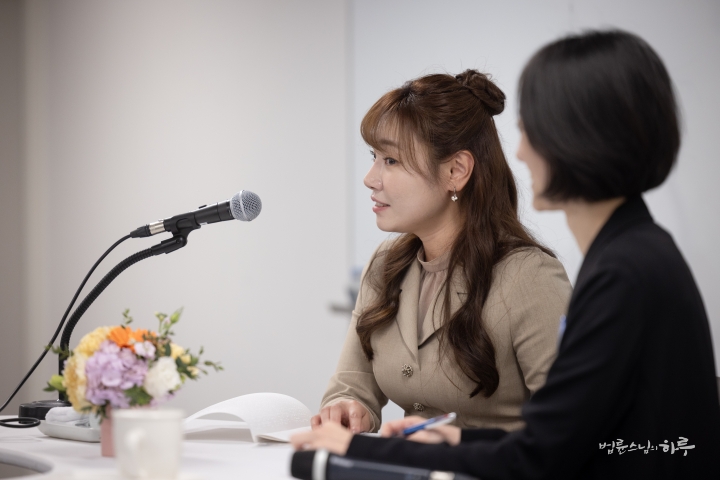
After the lecture, Sunim moved to the reception room and had tea with National Assembly member Kim Ye-ji. Kim Je-dong, who was scheduled to appear in the next program, also arrived early and joined the conversation.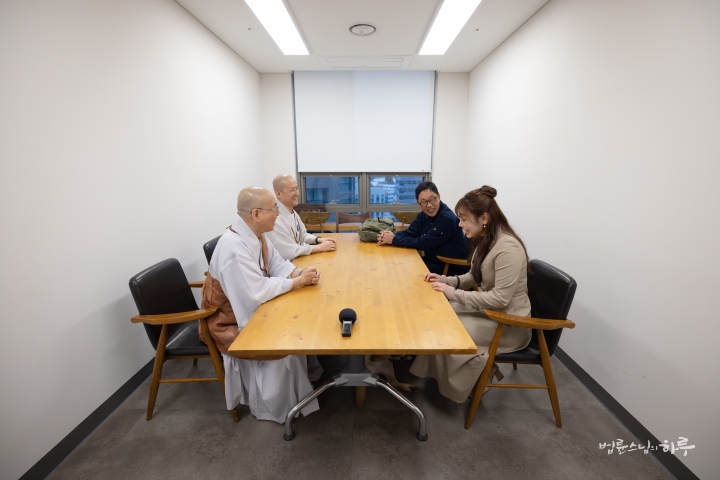
They continued deeper discussions about deep institutional challenges that Korean society has yet to resolve, such as reforming the protective admission system for people with mental illness, the excessive burden of care placed solely on families, difficulties in decisions about death with dignity and life extension, and organ donation consent procedures. In particular, Sunim shared his direct experience with the issue of discontinuing long-term life-sustaining treatment and emphasized the need for social review organizations. Assembly member Kim Ye-ji pointed out that while change will take a long time because Korean society is rooted in family-centered culture, it absolutely needs discussion.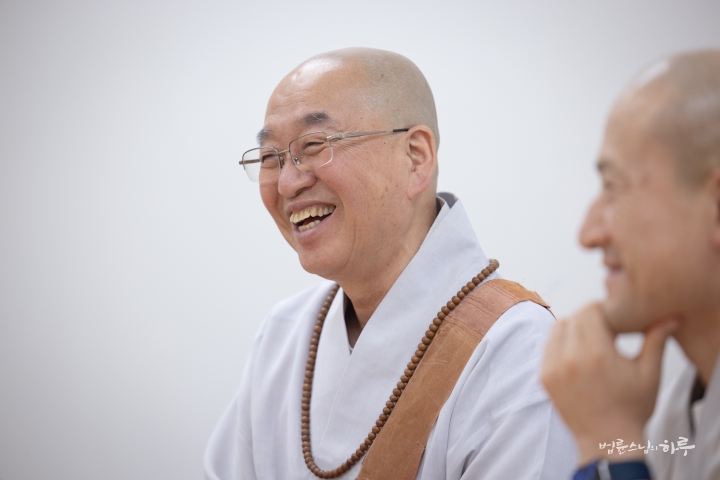
After finishing tea, they took a commemorative photo together.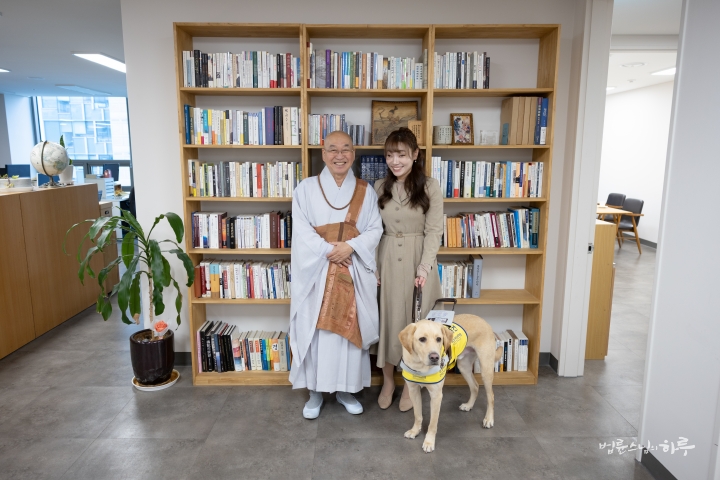
From 2 PM, Kim Je-dong’s Direct Talk Talk lecture continued. About 500 young people were seated in the underground auditorium. Before starting the lecture, singer Nan A-jin energized the atmosphere with lively songs.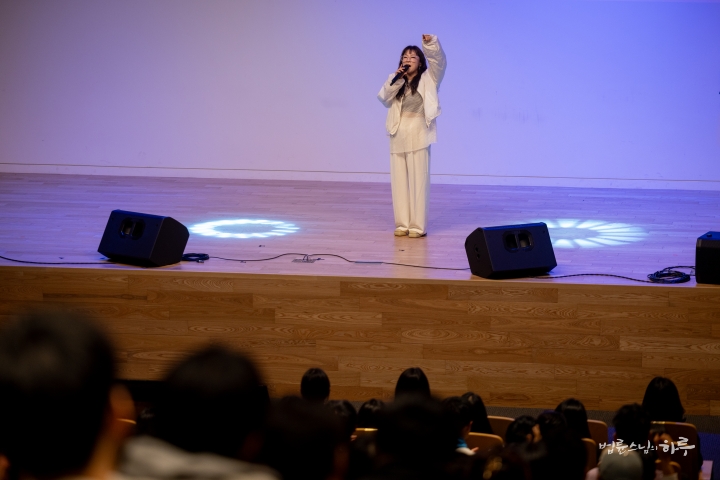
Then Kim Je-dong came up on stage to great applause and delivered his message through humor and stories, telling them not to be discouraged and to turn the world upside down.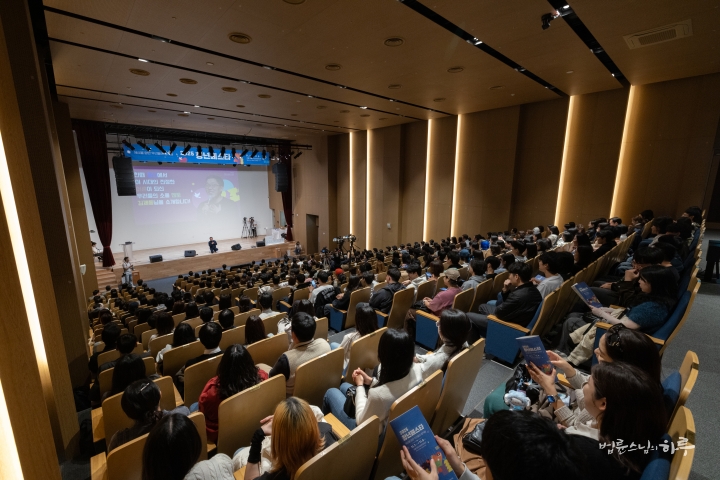
“Why should young people be discouraged? You don’t need to be discouraged in front of anyone. The world, you know, if you just twist it a little and throw out ‘Why is this like this?’ you’re already finding your own path. Nobody in the world knows all the answers. Me too, I’m always wavering and wandering. But that wavering isn’t bad – that’s the power and talent of youth. You don’t need to be scared of the AI era either. In the end, what only humans can do is laugh, worry, make friends, and care for each other’s hearts. Don’t try too hard to find big answers, just laugh gently a few times a day and lighten yourself up. Don’t worry about what others think, just slightly turn toward your joy. It’s okay to be anxious, it’s okay to waver, and questioning and turning things upside down and taking one step forward in that state – I believe that’s the real power of youth.”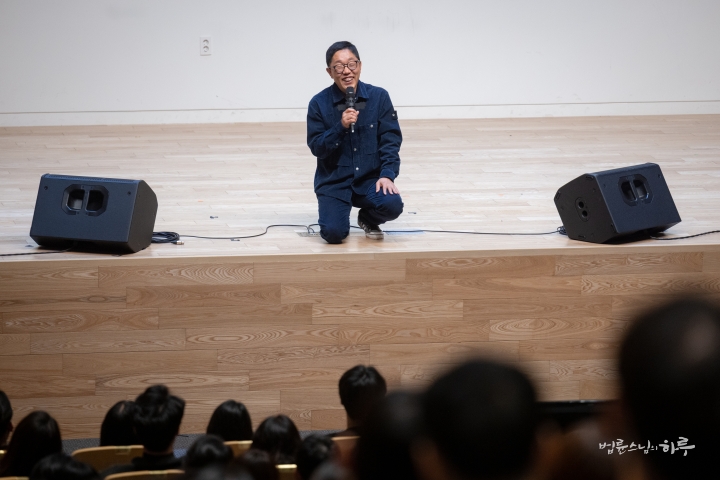
When the lecture ended and the Q&A session began, Kim Je-dong caught the atmosphere of “What should I ask?” flowing through the hall and first pointed to Venerable Pomnyun Sunim.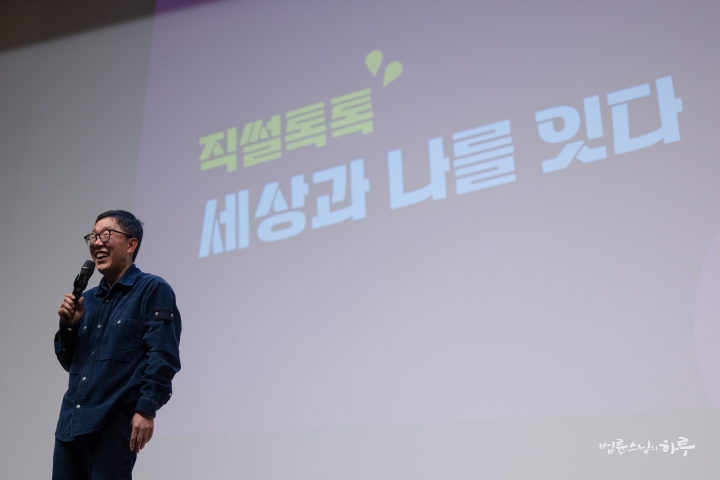
“Sunim, you’ve spent your whole life listening to others’ questions, so today let young Pomnyun ask a question!”
When the microphone was passed, Sunim immediately shared his concern.
“How can I get Kim Jong-un and Trump to meet? That’s my concern.” 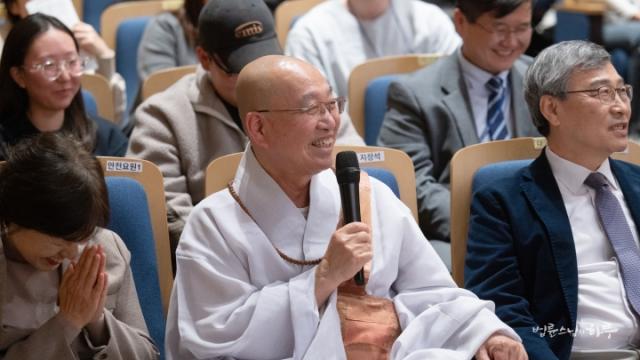
When Sunim threw out the heavy international relations question, the auditorium burst into laughter, and Kim Je-dong caught it right back.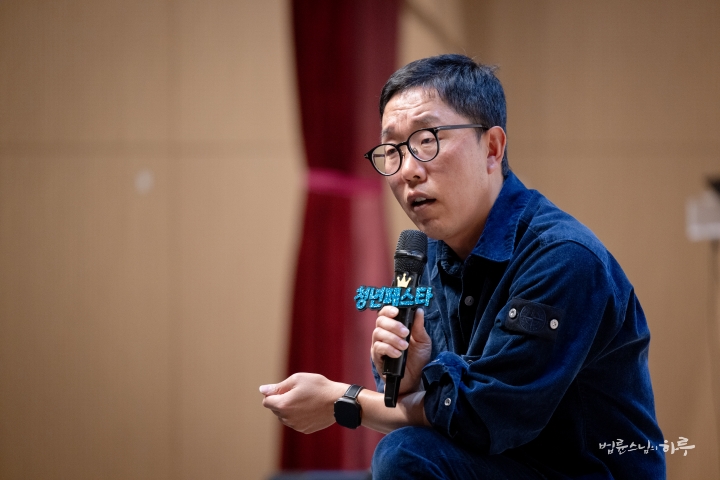
“Sunim, please keep your feet on the ground! We’re talking with young people and suddenly a summit meeting…!”
Yet he naturally connected Sunim’s question to a message about thinking about young people’s role in the midst of great changes of the times.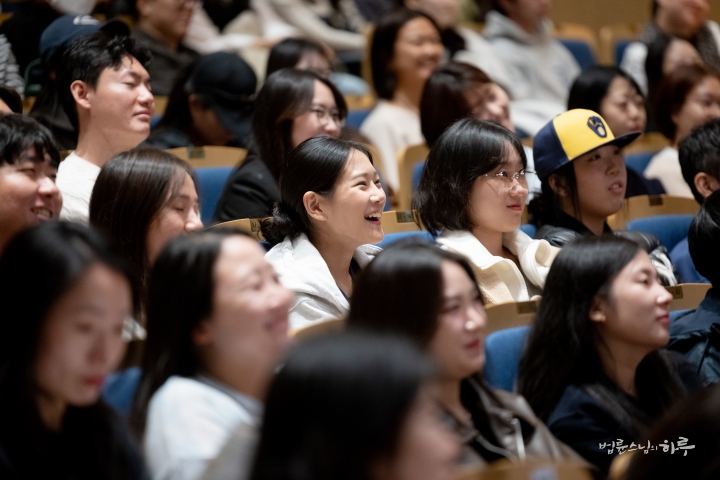
The questions that followed were also diverse, fitting the atmosphere of the young people. The conversation naturally flowed to realistic concerns like confidence, loneliness, dating, education complex, unification, youth politics, and anxiety in the midst of changing times. Kim Je-dong shared a long breath with the young people, moving between light jokes and deep comfort, and finished with a deep bow.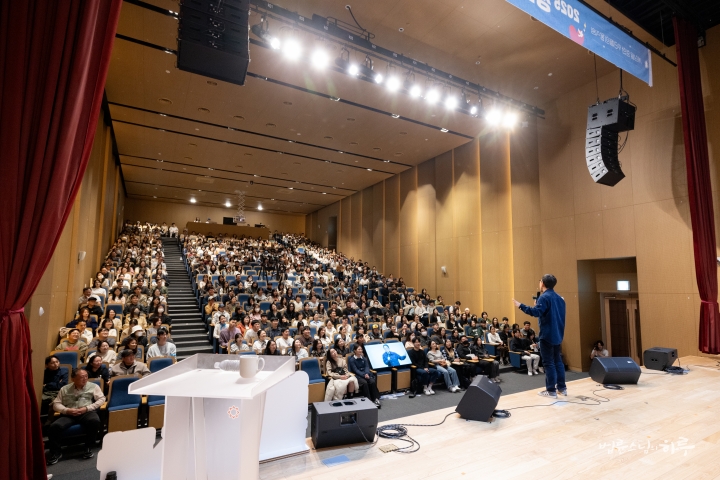
“It’s fine to be happy from time to time. Let’s laugh gently three times a day. You are the generation that will open Korea 100 years from now.”
After finishing the lecture, Sunim immediately had tea with the next speaker, Seoul Superintendent of Education Jeong Geun-sik, at 4 PM. Before the lecture, they conversed about various topics centered on the purpose of the Youth Festival, the reality of the education field, and their respective experiences. In particular, Superintendent Jeong Geun-sik mentioned the recent series of student deaths and expressed how heavy an educator’s heart is. In response, Sunim emphasized the need to station counseling specialists at each school and strengthen early detection and treatment systems. He also suggested practical alternatives such as structural improvements like forming small classes and assigning multiple homeroom teachers rather than placing students with emotional difficulties in one class.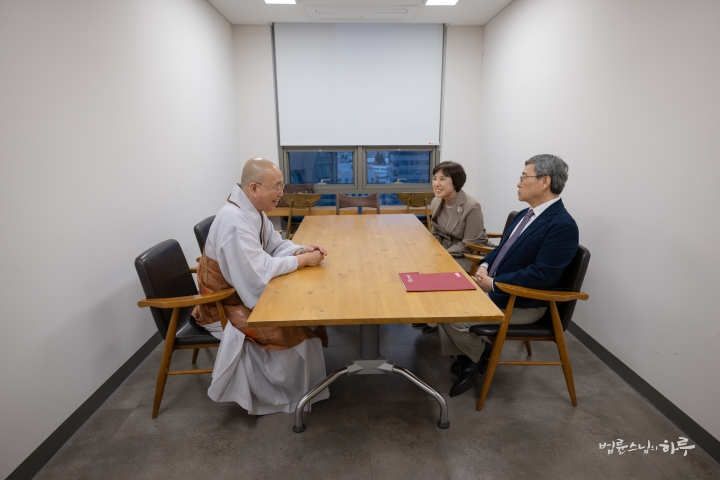
After 30 minutes of conversation, it was time for the lecture, so they moved together to the 9th floor auditorium. Superintendent Jeong Geun-sik came on stage to great applause and gave an hour-long passionate lecture on the theme of ‘Cooperative Education Without Competition.’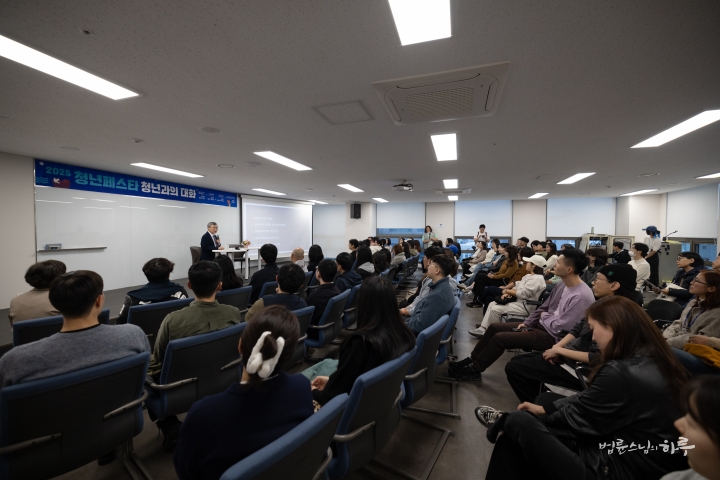
“The schools you attended and today’s schools have completely changed. We’ve moved away from competition and grade-centered education to an era where it’s more important to care for students’ emotional difficulties like anxiety, depression, and loneliness and to nurture ‘mental health.’ Children need ‘relationship building, emotional regulation, and self-understanding’ more than studying, and parents and teachers also need to continuously learn to keep up with rapid social changes. When each young person builds their life at their own pace and grows as democratic citizens with abilities for cooperation and empathy, future society will be healthy. Above all, the most important task for Korean education is for the older generation not to force their unfulfilled dreams on their children, but to trust and let go so children can choose their own lives.”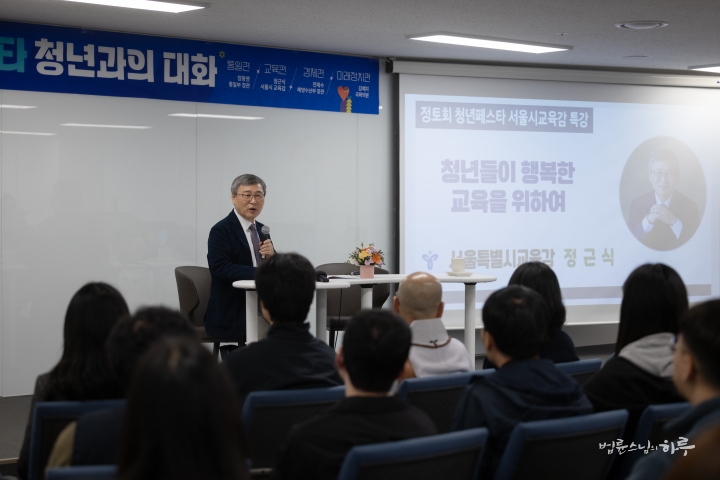
Various questions addressing real education problems continued from the audience. A participant working as a special education teacher asked how to support slow learners and students with disabilities in the AI era. The superintendent explained that the ‘Learning Diagnosis and Growth Center’ for dyslexia, dyscalculia, and slow learners, customized AI and edu-tech programs, and a broader special education system are rapidly expanding. Questions also arose about youth unemployment, aptitude issues, and job changes in the AI era – anxieties that young people directly experience. The superintendent emphasized that self-direction and cooperation abilities are more important than getting jobs at large corporations in this era, stressing that young people need the courage to find their own paths. Sunim sat in the audience and listened attentively to the lecture content until the end.
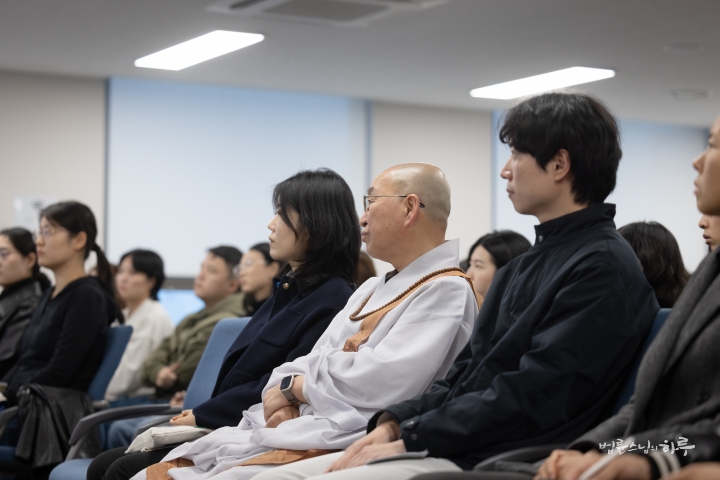
Meanwhile, a silent DJ party was in full swing on the 15th floor rooftop of the Jungto Social and Cultural Center. Young people wore wireless headphones and freely enjoyed music, moving their bodies to their own rhythms. Not a single sound escaped outside the rooftop.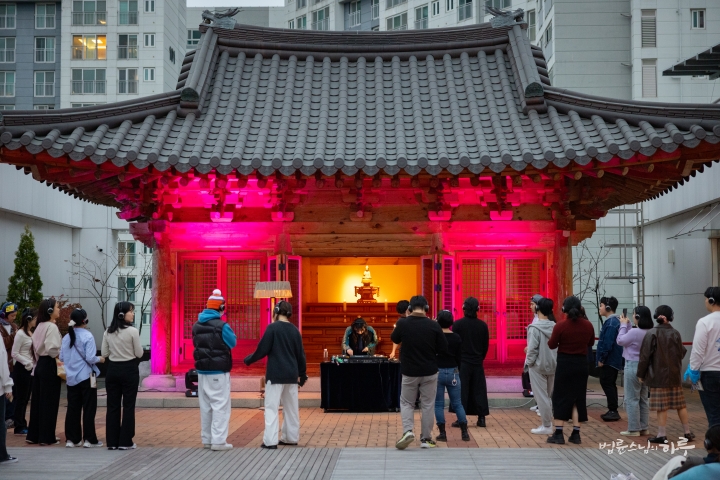
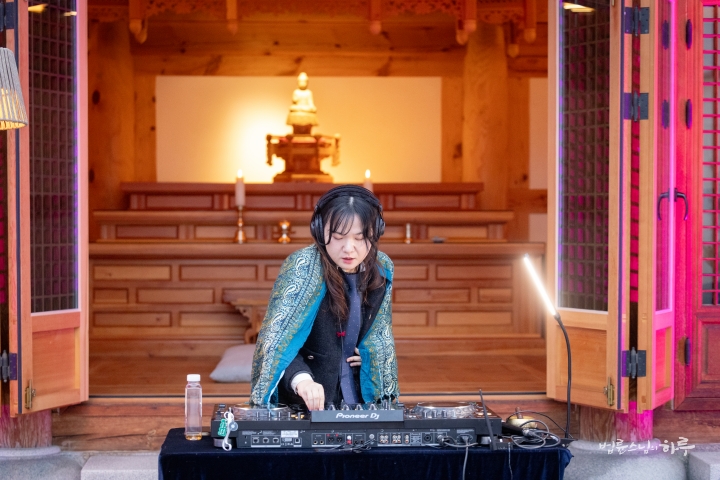
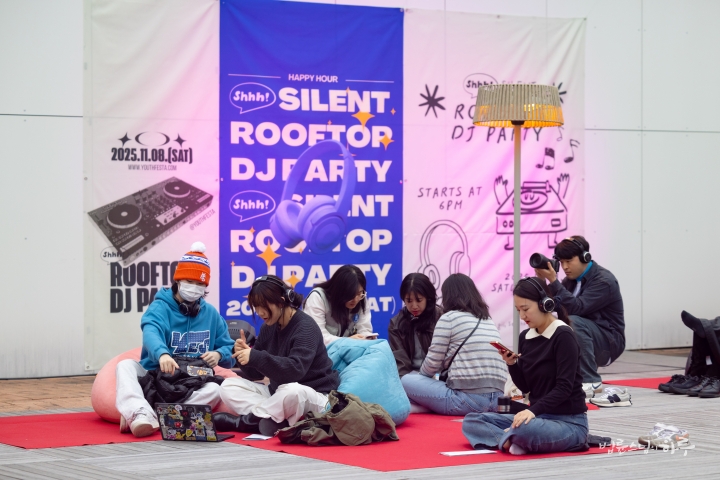
At 6:30 PM, Jung Eun-hye, an actress and artist with disabilities, visited Sunim with her family for tea and conversation. Ms. Jung had appeared at the Youth Festa’s Eco Cinema corner held in the 6th floor conference room from 4 PM to 6 PM, where she had conversations with young people. She shared how wonderful it was to have time to talk with the youth, and they exchanged updates about their lives.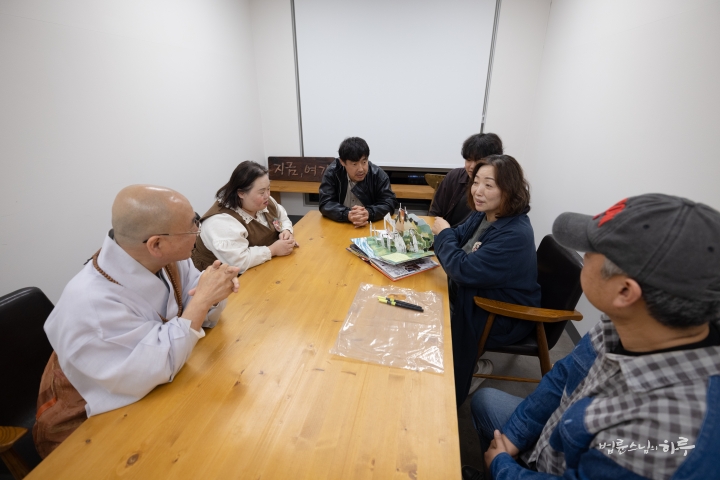
Ms. Jung presented Sunim with a signed book made from her own paintings as a gift.
“Thank you. What a wonderful gift.” 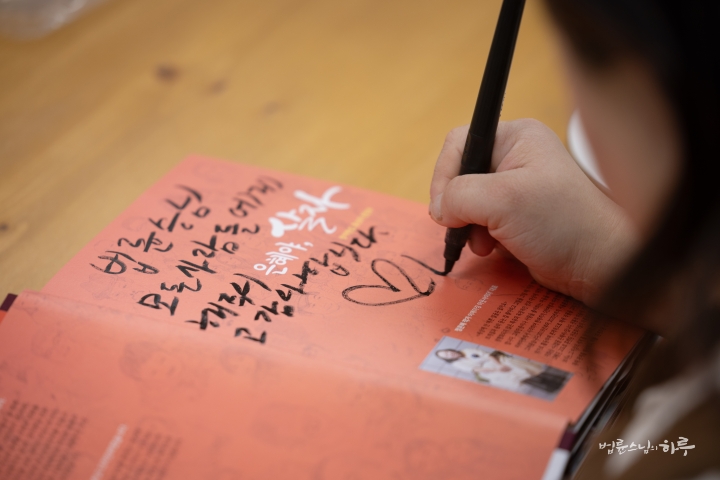
Ms. Jung then shared her recent concerns with Sunim.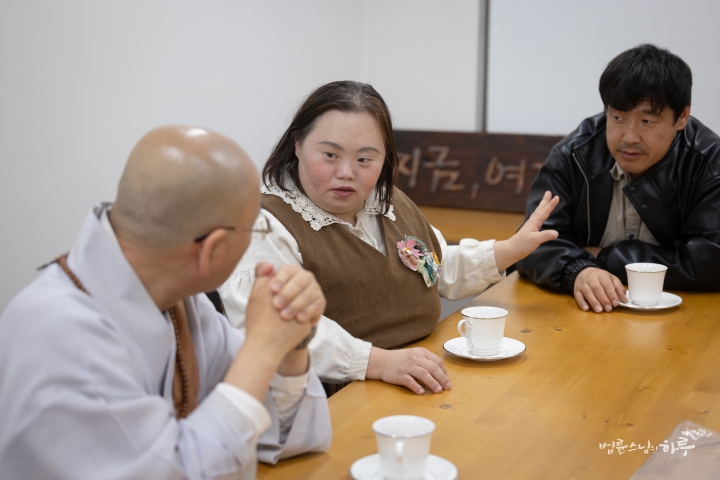
“I became somewhat famous after appearing in a drama. But since then, I haven’t received any casting offers, which worries me. While I enjoy painting, I also want to act. I can make a living just by painting diligently. But I want to earn a lot of money.”
Sunim replied with a smile.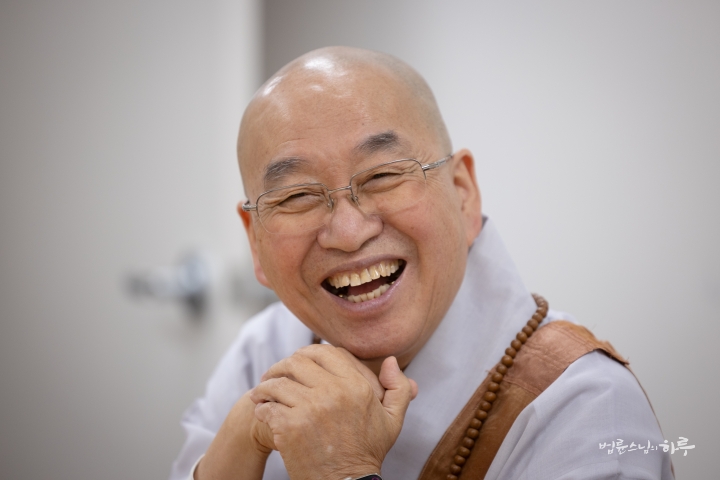
“Whether it’s acting, writing, or painting, if you work hard simply because you enjoy it, sometimes you’ll make money and sometimes you won’t. Becoming wealthy from money earned naturally this way is fine. But if you cling to the goal of ‘becoming rich’ itself, you become a slave to money and will live your entire life controlled by financial worries. There’s no need to live that way.”
“Yes, you’re right.”
As Ms. Jung’s family members also shared their concerns, it was time for Sunim to begin his lecture. Though it was regrettable, they took a commemorative photo together and said their farewells.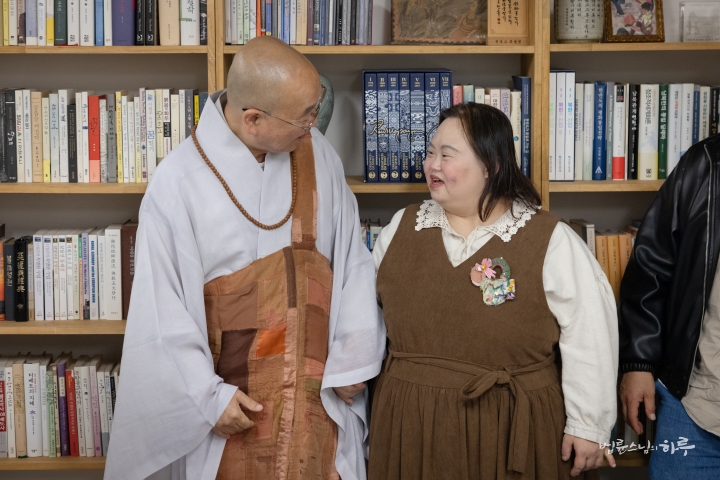
Sunim hurried to the underground auditorium. With about 450 people seated, the Dongguk University Baeksang Cheering Squad gave an opening performance before the lecture.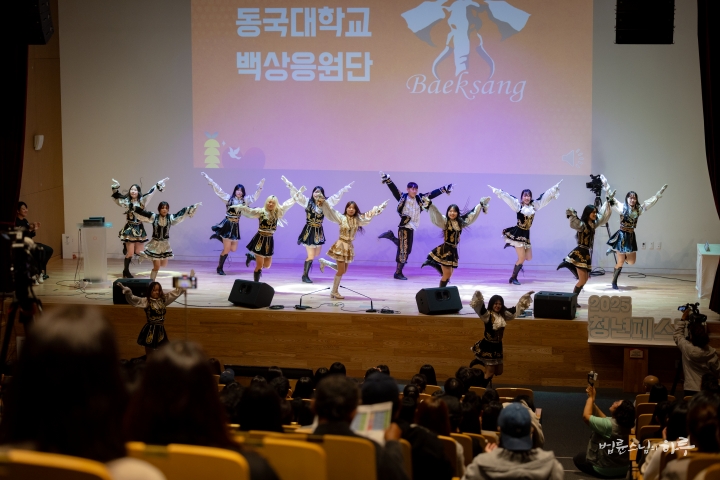
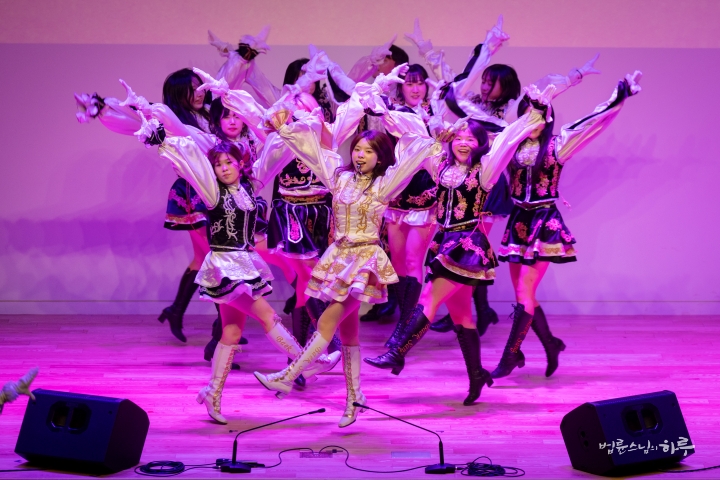
As the performance continued with precise movements, lively rhythms, and animated gestures down to the fingertips, applause erupted. The energy of the youth filled the space.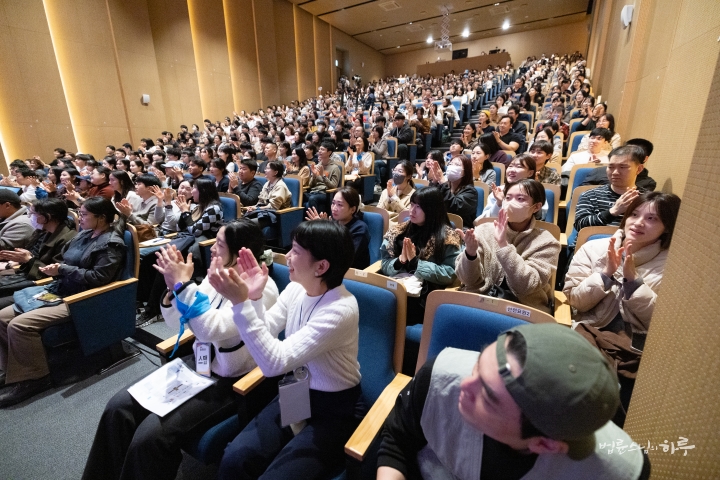
Following the vibrant performance, everyone watched a video about “peace,” today’s lecture theme. When the video ended, Sunim walked onto the stage to great applause. First, Sunim greeted everyone with a smile.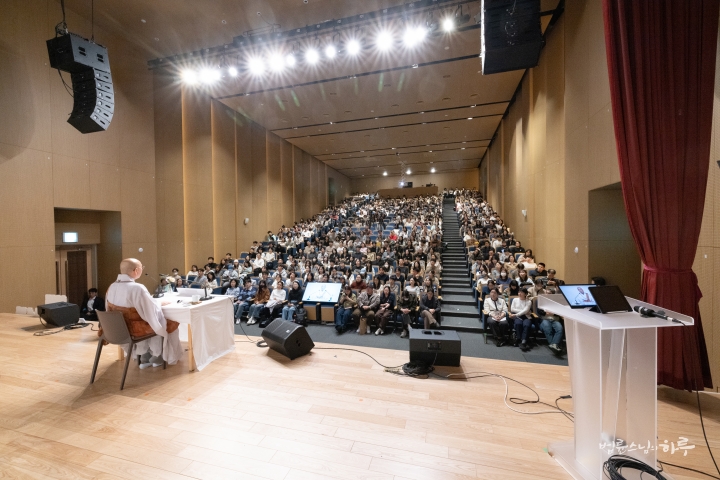
“Did you enjoy exploring the various booths prepared for today’s Youth Festa? And did you enjoy the lectures?”
“Yes!”
“While this event continues until tomorrow, this lecture is the last program for today, the second day. The theme of this lecture concerns our society’s issues rather than individual problems. However, ‘social issues’ don’t arise completely separate from individuals. Individual problems can accumulate to become social issues, and there are also aspects that operate independently of individual influence. That’s why Jungto Society makes ‘practice’ – which prevents us from falling into suffering regardless of our circumstances – the foundation of life. At the same time, we carry out various social activities with the intention of making our society more peaceful, just, and sustainable. These activities include movements for peace on the Korean Peninsula, relief work to help neighbors in need, and environmental movements to respond to the global climate crisis. Now, let’s have a conversation based on your questions.” 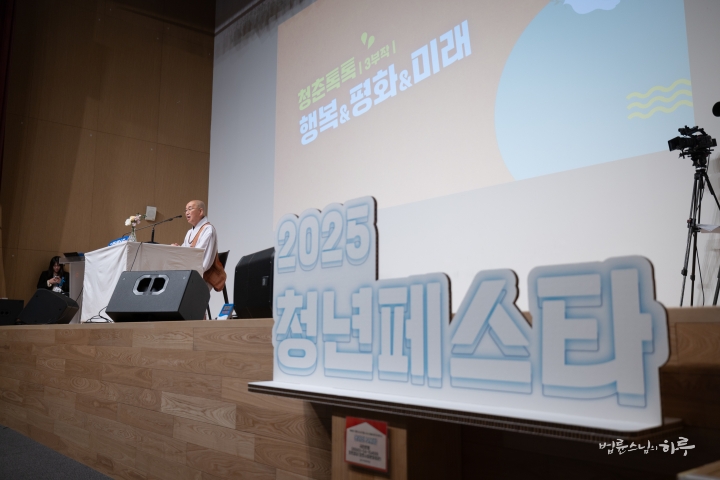
Anyone with questions about peace issues or our society could raise their hand and ask. For an hour and a half, four people asked their questions and had conversations with Sunim. One person shared concerns about how to relate to others in today’s extreme social atmosphere.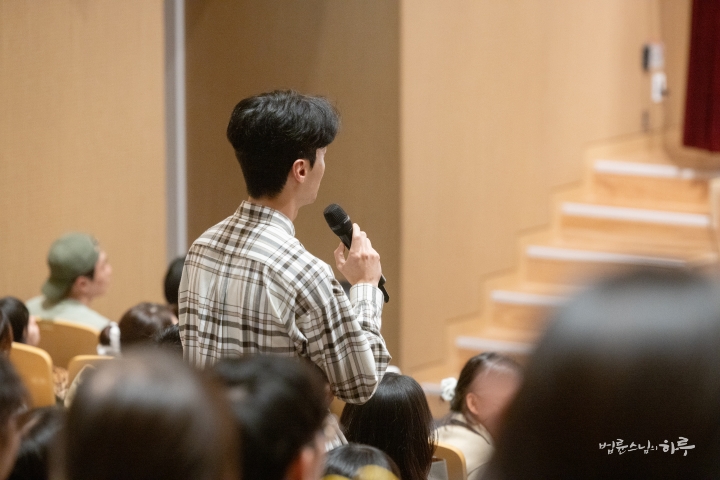
Should I Try to Have Conversations with People Who Have Different Political Views?
The first trigger was the December 3rd martial law issue and experiences during the presidential election period. These were important issues that could greatly affect the nation and people’s lives, but among my acquaintances, there were those who defended the martial law or said that even those responsible should be respected. At that time, I became deeply concerned about how dangerous our society could become if we couldn’t even persuade close people on such matters.
The second is the current ‘difficulty of conversation’ with people. I feel that many people tend to stubbornly insist on their own thoughts rather than trying to understand others. There were many cases where conversation was impossible. But when I discovered good-natured personalities even among such people, I questioned, ‘Is it morally right for me to reject them just because they’ve been influenced by certain political ideologies?’ So these days, when meeting new people, I wonder whether it’s better not to bring up politics at all, or whether it’s better to ask about their political views from the start and not form relationships if they don’t match. I’m curious whether I should live trying to have conversations and understanding with such people even if it means occasional conflicts, or whether avoiding conflict is a better way of life.”
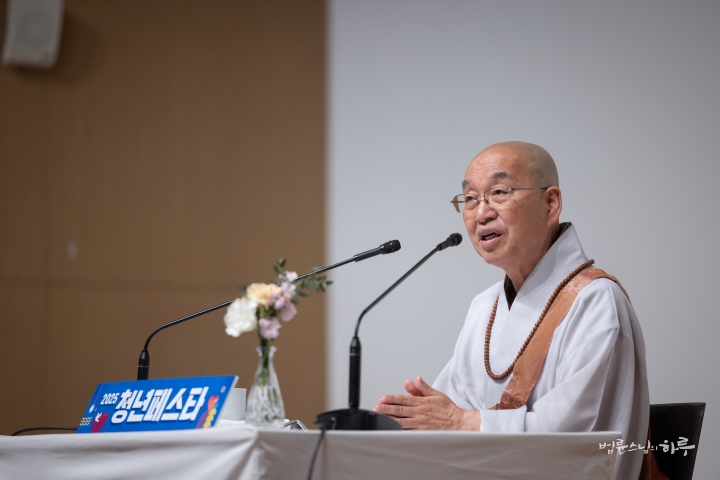
“I’d like to ask you a question in return. When forming relationships, how do you accept a person’s religion? If someone’s religion differs from yours, do you think it’s right to cut off the relationship without even having a conversation? Or do you think it’s better to converse and interact even if your religions differ? Or do you think it’s better to only associate with people whose religion differs but who might be persuaded to convert, and not meet those without such possibility?”
“I’ve actually met people from certain religions. I find it difficult to understand or accept an attitude that unconditionally rejects others simply because of their different religion. I felt that forming relationships with such people could endanger my life. However, I think most religious people who aren’t like that are quite acceptable. What has confused me recently, though, is that our society is becoming extremely polarized. This is clearly evident just by looking at party support rates or presidential approval ratings. If we can listen to and respect each other’s stories based on diverse religions or values, I would gladly converse with them and take their views into consideration. But these days, there are too many people caught up in extreme ideologies who disparage each other. Seeing this reality, I worried, ‘If I reject all of them, I won’t be able to form relationships with anyone.’ I’m wondering what I should do in this situation.”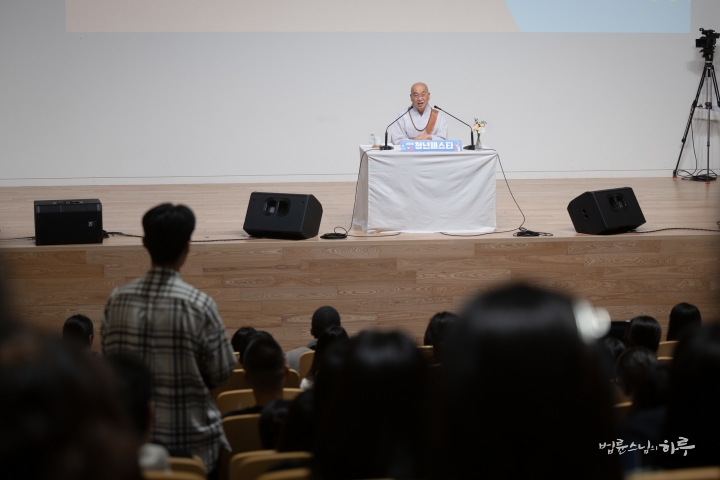
“That’s why I asked you that question. In my various social activities, I believe I can willingly cooperate with people of different religions if we share the same views on specific issues. It doesn’t matter whether they’re Christian pastors, Catholic priests, or Won Buddhist ministers. Although our religions differ, if we share the same views on issues like humanitarian aid to North Korea or responding to the climate crisis, I can cooperate and interact with them. In such relationships, I don’t tell them to convert to Buddhism. We only work together on matters where our intentions align.
However, there are people in the world who have different political ideologies and only want to cooperate with the purpose of changing others. Or some religious people think, ‘We can’t work together unless you convert.’ That’s because their purpose is evangelism. In such cases, if there’s no possibility of change, they wouldn’t want to spend time on that person. But if evangelism isn’t the purpose, religion isn’t that important when meeting people. If you share the same goals, you can work together.
Politics is the same. If you’ve agreed to meditate together, you can meditate together even with different political orientations. If you share the same awareness about solving the climate crisis, you can do environmental work together even with different ideologies. If you share the same perspective on peace on the Korean Peninsula, you can work together regardless of religion or political position. People with conservative tendencies might have progressive views on peace, and people can unite under the goal of peace on the Korean Peninsula regardless of their political views, thoughts, or religions. In fact, there are religious organizations that are very active on peace issues. 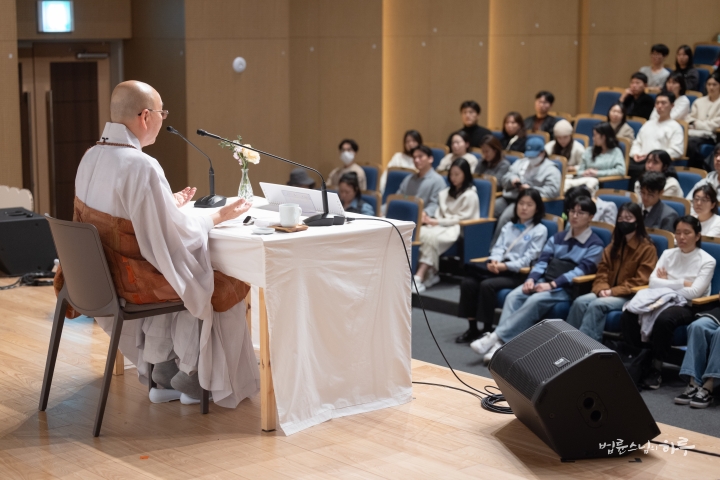
Let me give you an example. During the first term of the Trump administration, President Trump sometimes seemed to act as he pleased without following the U.S. Constitution or laws. But from the perspective of dialogue with North Korea, President Trump actually opened up possibilities. While Democratic figures like Obama, Clinton, and Biden wouldn’t even attempt dialogue with Kim Jong-un, President Trump opened the door to dialogue by saying ‘Kim Jong-un is smart and intelligent.’ Then we must ask: What is most important to us now? It’s peace on the Korean Peninsula. On this issue, it might be necessary to cooperate with Trump. Even if we don’t agree with his other policies, we must work with those who look in the same direction on the peace issue.
When Trump visited Korea in the past, the progressive camp shouted not only ‘No to war’ but also ‘No to Trump’s visit to Korea.’ I only shouted against war. I suggested removing ‘No to Trump’s visit,’ but they didn’t accept it. However, I thought that since Trump has a dual nature capable of both war and peace, just saying ‘No to war’ was sufficient.
This is why we must not fall into ideological extremes. The attitude of ‘That person is bad, so there’s no need to talk’ is dangerous. Keeping the door of dialogue open with everyone – this is what’s important. Christianity believes conversion is necessary to believe in God, but Buddhism takes the view that while believing is good, not believing is also fine. If we don’t understand these differences and demand ‘You must become like me,’ dialogue becomes impossible. Even if I, as a monk, pay for the meal, a pastor can say the prayer. Once a month, I invite neighboring religious leaders for a meal, and I ask the pastor to pray. 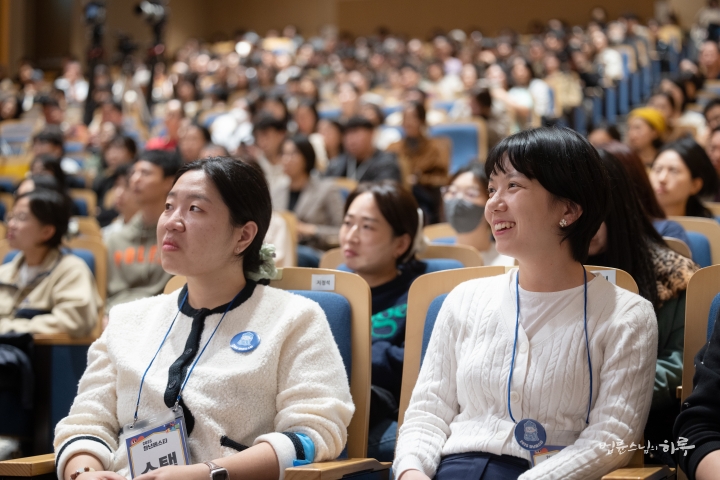
This is culture. When we can respect and accept each other’s cultures, we can work together. Even with selfish people, if cooperating with them benefits our common interests, it’s wise to accept that and cooperate.
Looking ahead, cooperating with Japan might be advantageous for us. Rather than dwelling on the past, it’s wiser to join hands for future benefits and then resolve past issues. The same applies to inter-Korean issues. If we only focus on the past Korean War, cooperation is impossible. But if cooperation benefits us now, we should resolve past issues on that foundation.
But now the ruling and opposition parties in the National Assembly are fighting, calling each other targets for elimination. If we do that, North Korea, Japan, and the opposing party all become targets for elimination. Is that the right approach? No. Of course, clear crimes must be punished according to law. But refusing dialogue simply because someone thinks differently drives society toward division. 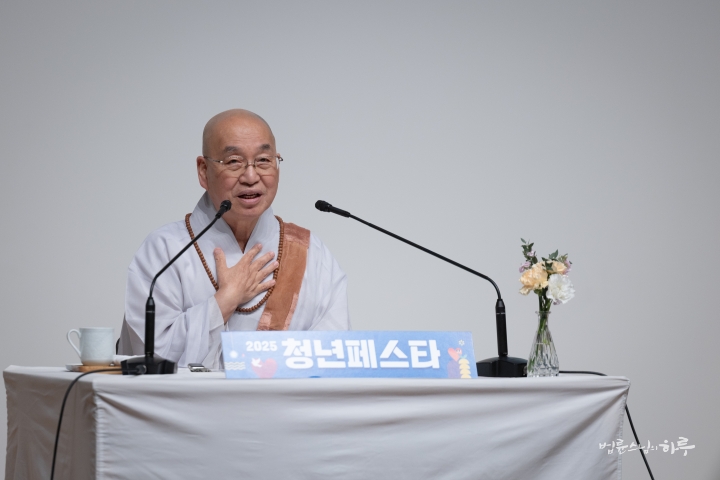
We must have dialogue even with different ideologies or religions. If there are commonalities, work together; if not, go separate ways. But if you push with force, there will inevitably be backlash. When progressives push, conservatives resist; when conservatives push, progressives resist. That’s why inter-Korean relations have repeated this pattern for 50 years – one administration takes a step forward, the next takes a step back. Now, instead of trying to take two steps forward, the ruling and opposition parties should agree to take just one step forward, but ensure we don’t step backward even when administrations change. If we had done that, we would be much closer to peace now. This kind of wisdom is needed.
These days, ideological extremes have become so severe that someone like me is called both leftist and rightist. But I don’t attach meaning to such classifications. Whether inside or outside North Korea, or in South Korea, if people are struggling and suffering, we should help them. But when bound by ideology, some argue we shouldn’t help people because they’re inside North Korea, while others say we shouldn’t help because they escaped from North Korea. These are all judgments based on political positions. Helping people because they’re struggling, regardless of where they are – that’s the non-political, humane attitude. In conclusion, I believe we should live with the door of dialogue open to everyone.”
“Thank you. I understand well.”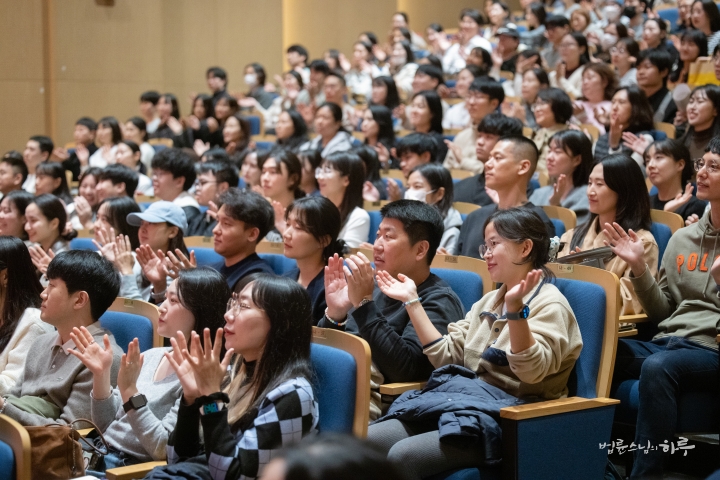
Questions continued to follow.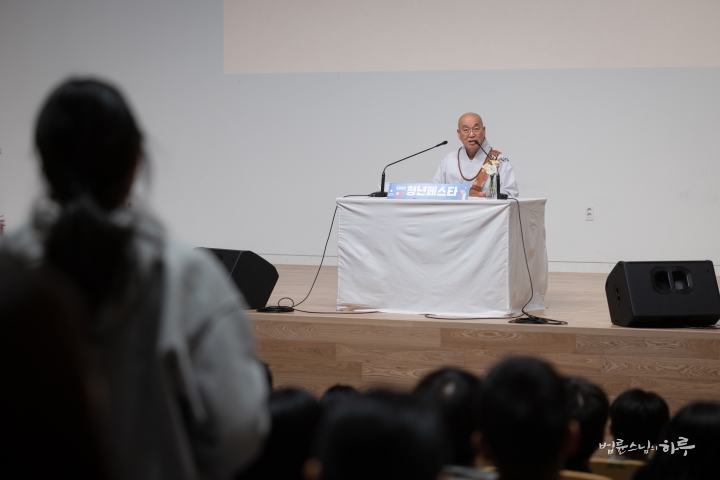
While I agree that peace on the Korean Peninsula is essential, over time, North and South Korea have diverged significantly in political, social, and cultural aspects, and the necessity for unification doesn’t feel as urgent as before. In this situation, why do you still believe unification is necessary?
Seeing recent threats to democracy, I’ve developed a fear that democracy could regress again through elections with North Korean residents after unification. How should I view unification amid such anxieties?
As a teacher facing students who have lost their peace of mind in the classroom, I struggle daily with what role I can play. How should I determine the boundaries of how far I can intervene for my students and what lines I should maintain?
What standards should we have to balance national interests and universal human values amid international conflicts? What position should South Korea take as a nation, and what direction should we as citizens demand from our politicians?
As the conversation concluded, Sunim discussed the three challenges facing our society and the roles of the nation and youth within them.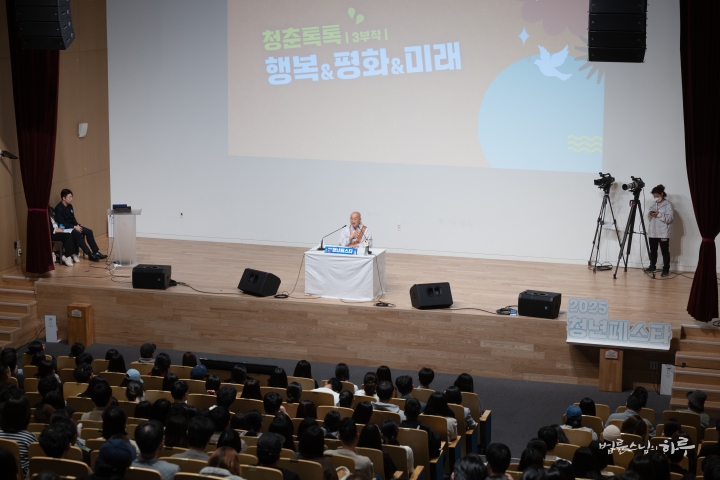
“In my view, the three biggest challenges facing our society are: first, peace; second, national unity; and third, sustainable development. Unity here doesn’t mean everyone must be the same. It simply means we shouldn’t treat each other as enemies. While we may have different thoughts, a healthy society doesn’t hate or treat others as enemies because of those differences.
For a Society Where Youth Can Have Hope
Another thing I’d like to mention is that rather than criticizing the younger generation for low birth rates, we should consider the causes and think together about what needs to be resolved first to increase birth rates. The first problem to solve is housing. For example, we should create small rental apartments of 10 or 15 pyeong in convenient urban areas, especially near subway stations, so young people can live near their workplaces by paying only about 10% of their salary. The second issue is private education. We need to establish a system where public education alone is sufficient at least through middle school. Even now, many people hesitate to have children due to the burden of private education costs. While I can endure being discriminated against myself, it’s hard to bear seeing my child discriminated against at school for being poor. So people decide it’s better not to have children at all. Therefore, we need to establish a social system where the state takes responsibility up to a certain level when children are born. Simply saying ‘we’ll give you 10 million won if you have a child’ won’t increase birth rates. Because we are not baby-making machines. 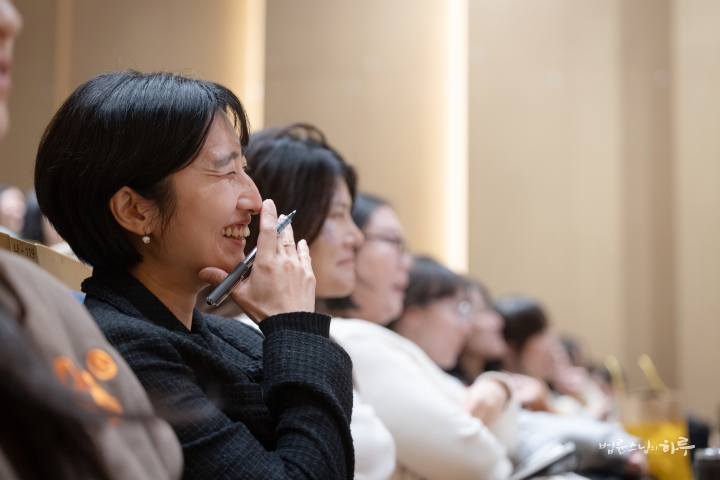
The housing problem in particular can be sufficiently resolved with just slight changes to the social system. The older generation has cars and economic means, so they can move to the outskirts of cities. However, the younger generation cannot, so we need to supply rental housing in convenient downtown areas near transit stations. We need to create a structure where people earning 2 million won can live by paying just 200,000 won in rent, or those earning 3 million won pay just 300,000 won.
Housing, education, and healthcare are the three most fundamental elements of people’s lives. Among these, healthcare is somewhat institutionally stable, but housing and education remain unresolved challenges. If we properly solve just these two problems, people can live stable lives working at small and medium enterprises without necessarily getting jobs at conglomerates or large corporations. I believe the state’s role is to create a foundation where people can live without necessarily high wages. In fact, these things are not difficult at all. Considering how tens of trillions of won were invested in projects like the Four Rivers Project in the past, it’s entirely possible if we allocate such budgets. 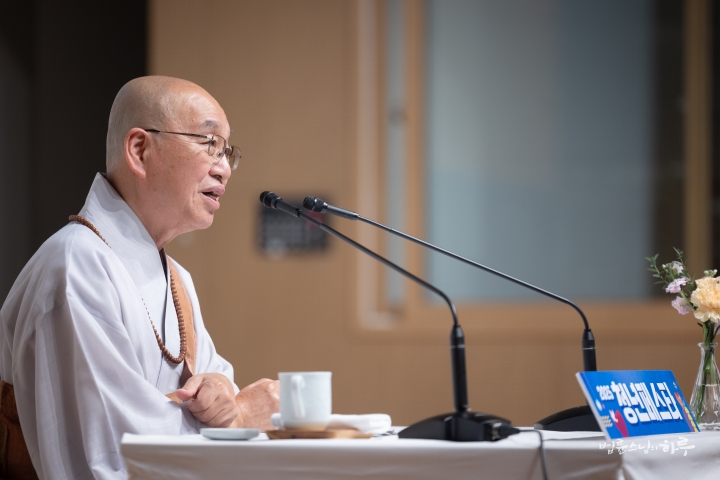
So I ask of you all: Don’t be blind followers of politicians, but become citizens with political consciousness. We need civic awareness to voice opinions so that our tax money is used rationally for the people and to reflect our will through voting. When there are more citizens who think and judge for themselves and participate directly in voting, rather than just following someone’s words after watching YouTube, our society can face true change. If we become completely indifferent to social issues, the world will ultimately be moved by a small number of zealots. Then society will inevitably flow in an undesirable direction. I hope you will become citizens who have awareness of social issues and actively participate.”
The second day of the Youth Festa concluded with loud applause.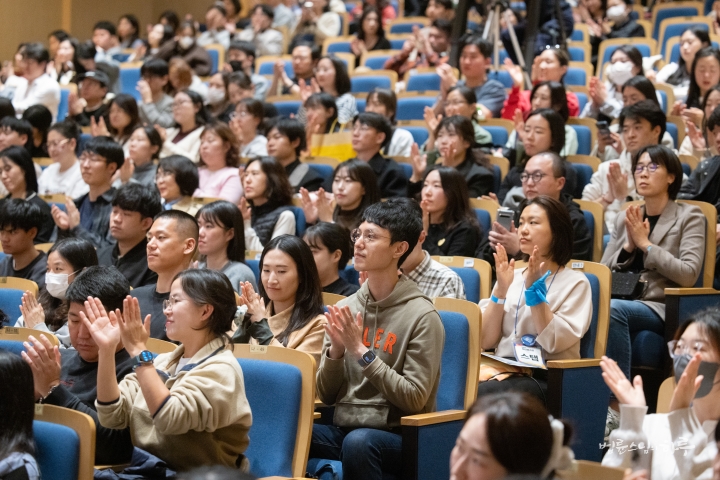
After all the participating youth left the Jungto Social and Cultural Center, the supporter volunteers cleaned their assigned areas, wrapped up, and prepared for tomorrow’s program.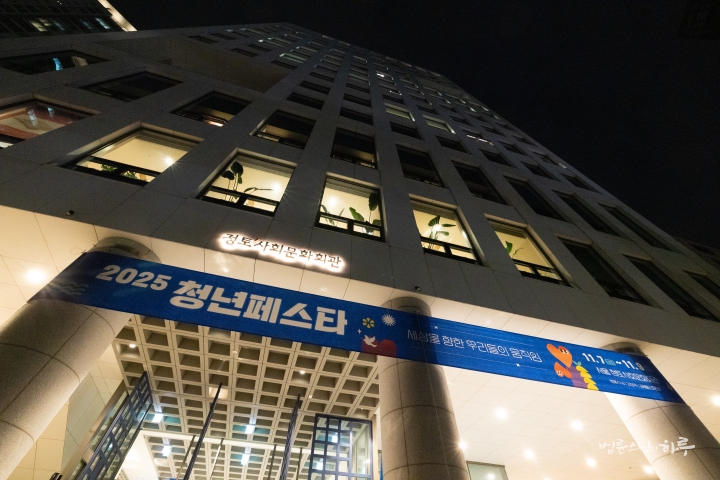
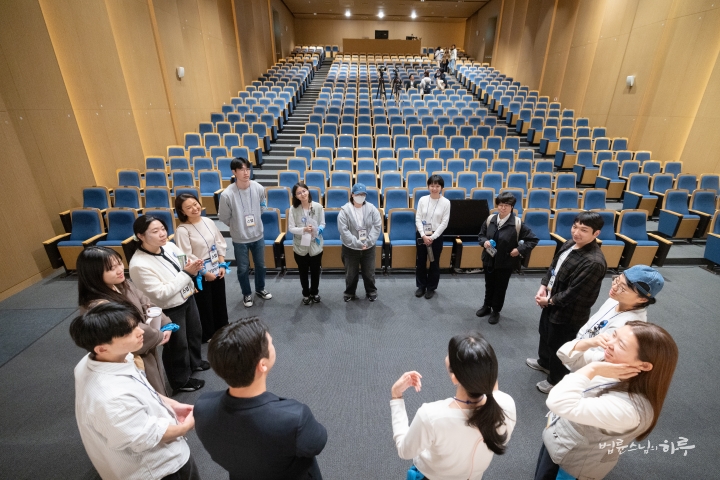
Tomorrow is the third and final day of the Youth Festa. In the morning, actor Jo In-sung will have a dialogue with youth on the theme “Finding Life’s Path Together,” and in the afternoon, Sunim will have a dialogue with youth on “Stories of Hope for Youth in the Era of Climate Crisis and AI,” followed by the closing ceremony to conclude the three-day Youth Festa event.





